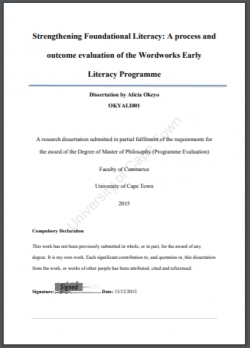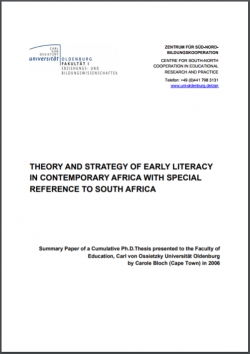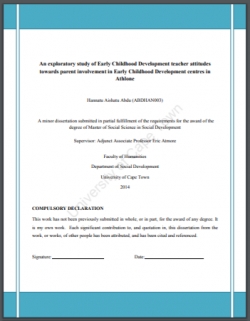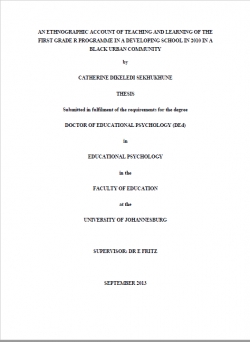The development of a school-wide progress monitoring assessment system for early literacy skills

Type
Thesis
Authors
Category
ECCE, Foundation
[ Browse Items ]
Publication Year
2014
Publisher
North West University, Potchefstroom, South Africa
URL
[ private ]
Pages
p.
Subject
Early childhood education, Primary education, Foundation Phase, Reading assessment, Progress monitoring, Early literacy skills, Comprehensive assessment system, Beginning reading, Instructional decision making, Literacy levels, South Africa
Abstract
Across the country, there is a growing awareness of the dividends of early reading success and the stark consequences of early reading failure. A number of assessment studies in recent years have shown that the educational achievement of learners in South African schools is unacceptably poor. The 2011 Annual National Assessment results indicate a 35% literacy rate for South African learners in Grade 3 and a 30% literacy rate for learners in the North West Province of South Africa. According to Kanjee (2008), there is a growing trend in South Africa towards the use of assessment to improve learning. The aim of this study is to develop a school-wide progress monitoring assessment system for early literacy skills. In beginning literacy, the development of this school-wide progress monitoring assessment system will be based on the premise that useful assessment of learner progress should be formative in its instructional effects and that it needs to focus teacher attention on data representing the results of their efforts. The development of a school-wide progress monitoring assessment system can help identify and strategically intervene before learners become part of the low South African literacy rate statistic. It is generally recognised that reading is developmental and acquired over time. From the convergence of more than 30 years of scientific research, researchers now have a solid scientific understanding of the core foundational skills in beginning reading. Foundational skills are prerequisite and fundamental to later success in a content area or domain. These skills differentiate successful from less successful readers and most important are amenable to change through instruction. One example of a comprehensive assessment system designed to assess these key foundational skills of early literacy for young learners is the Dynamic Indicators of Basic Early Literacy Skills (DIBELS). DIBELS measures, by design, are indicators of each of the Basic Early Literacy Skills. In this study, the aim is to collaborate with subject specialists (district level), school management teams (school level), and teachers (classroom level), in order to obtain an in-depth understanding of assessment practices in general, and specifically progress monitoring assessment as well as the assessment support needs of teachers and learners. The collaborative aim is to establish a school-wide progress monitoring assessment system that will not only enhance the assessment practices of teachers, but also the system-wide decisions that need to take place so that effective instructional decisions can be made at all levels, and most importantly at the classroom level. In this study, I chose to conduct a 16-month action research project in one primary school (i.e., the Happy Valley School) in one specific district (i.e., the Cloudy District) in the North West Province. From the data, it is clear that ANA dominates conversations related to assessment, especially in the foundation phase. Both at district and school level there is no clear indication that the information generated from assessments is the key evidence for continuous improvement in teaching and learning. The data also indicates that the government documents play a crucial role in guiding the actions of the stakeholders. The data indicate that progress monitoring relates specifically to “showing” or “proving” improved learning in language/literacy as measured by ANA. In addition to ANA, and at the classroom level, teachers monitor progress fairly “randomly”; they can decide what to ‘look’ for, usually by using their summative assessment marks, when deciding whether a learner is making progress or not. It is possible, therefore, that no two teachers will look at the same foundational literacy skill when deciding whether the learner is making progress in a particular skill. There is also no guideline for teachers in terms of what to aim for in order to ensure that learners make progress in core foundational literacy skills that evidence-based research has shown to have a major effect on reading achievement. In this study, I used a metaphor to illustrate the core components of a progress monitoring assessment and support rocket system. The aim of the rocket is to ensure that all learners achieve “lift off” and hit the identified targets, at all grade levels, on the way to reading success. In order to ensure that the rocket is launched effectively, all stakeholders have to fulfil essential tasks or roles. The assessment and support rocket system implemented in this study was developed to provide a prevention-oriented, assessment and support decision-making system to pre-empt early reading difficulty and ensure progress step-by-step toward outcomes that result in reading achievement for all children.
Number of Copies
1
| Library | Accession No | Call No | Copy No | Edition | Location | Availability |
|---|---|---|---|---|---|---|
| 1 | Potchefstroom, North West Province, South Africa | Yes |



